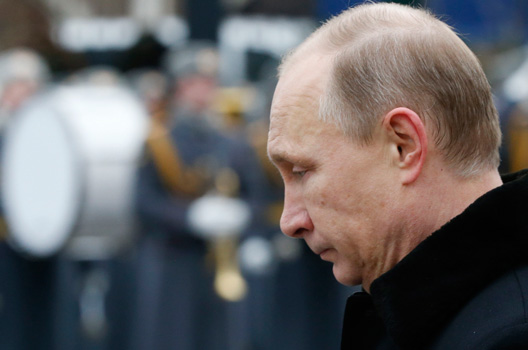 A vote for Brexit is a big win for Russia’s foreign policy. Moscow has made no secret of its desire to upend the post-Cold War settlement in Europe. Russian President Vladimir Putin and other senior Russian officials have regularly said that there will be new rules for global order or no rules. They insist that Moscow has the right to a sphere of influence in the post-Soviet space and have started wars in Georgia and eastern Ukraine that demonstrate the high price neighbors will pay for defying the Kremlin’s diktats.
A vote for Brexit is a big win for Russia’s foreign policy. Moscow has made no secret of its desire to upend the post-Cold War settlement in Europe. Russian President Vladimir Putin and other senior Russian officials have regularly said that there will be new rules for global order or no rules. They insist that Moscow has the right to a sphere of influence in the post-Soviet space and have started wars in Georgia and eastern Ukraine that demonstrate the high price neighbors will pay for defying the Kremlin’s diktats.
Moscow views close transatlantic relations and a strong relationship between NATO and the European Union as obstacles to its ambitions in Eurasia and its efforts to project power into Europe. The West’s weak response to Russian aggression in Georgia and, later, its annexation of the Crimean Peninsula, have encouraged the Kremlin to conduct its hybrid war in eastern Ukraine.
Moscow was surprised, at last, by the tough sanctions imposed by the United States and then the European Union after a Malaysian airliner was shot down over Ukraine in July of 2014. Those sanctions hurt—costing Russia 1-1.5 percent of GNP in 2015—and Moscow has worked assiduously on individual EU members, including Austria, Greece, Hungary, and Italy to block the renewal of sanctions.
The UK was one of the strongest advocates of EU-led sanctions against Russia. Its departure from the European Union would improve Moscow’s chances of getting sanctions relief . But there is no reason now to assume that a Brexit will make a difference. German Chancellor Angela Merkel has driven policy within the European bloc. Merkel remains adamant that sanctions should stay in place until the Kremlin fulfills its commitments to withdraw its troops and military equipment from Ukraine’s Donbas region and restore Ukraine’s control of its border with Russia.
Moscow’s interest in weakening the European Union goes well beyond sanctions. The UK’s departure from the European Union will remove the most capable military from the bloc. The West’s failed intervention in Libya—which Moscow, after its United Nations Security Council vote in support of a humanitarian operation, opposed—began with a decision in Paris and London to intervene. Such military activism from the European Union is less likely going forward. Yet, it is also true that the UK was a strong opponent of greater defense cooperation within the European Union; the UK’s departure might hasten such cooperation—a development that Moscow would not welcome.
Moscow has devoted great attention and resources to undermining the European Union’s energy policies, especially with gas pipelines and sales. With frequent success, it has cut deals with EU member states that reward and punish individual states for policies that have little to do with the gas sector. The UK was a strong voice in favor of a common EU energy policy, including with Russia.
With the looming departure of the UK from the European Union, a foreign policy bonus for Moscow may come in Scotland. In the Brexit referendum, 62 percent of Scots voted to remain in the European Union. The Brexit result is expected to increase support in Scotland for a break with the UK. Even if this does not happen, London may well be distracted by the possibility and pay less attention to a revanchist Kremlin.
The Kremlin likely understands that the full consequences of Brexit cannot be foreseen. It is quite possible that the UK, the European Union, and NATO may compensate for the referendum result in ways that cut against Putin’s interests. Military cooperation between NATO and the EU has been a complicated and fractious issue for more than a decade. Yet at the June 28 military summit held in Brussels, EU and NATO military leaders agreed to increase intelligence sharing and continue to cooperate closely from the Baltics to the Mediterranean, inter alia, to deter Russia. Moreover, if the UK decides that it has to reassure its European partners in the wake of Brexit, it may ramp up its already active role in NATO.
It is also unclear what impact Brexit will have on London’s role as the leading financial center in Europe and as one of the favorite Western homes of Russia’s oligarchs. Will the city’s financial reach within the European Union suffer as a result of a Brexit? Might that make London less attractive as a place to park money outside of Russia or as a place for Russia’s rich to enjoy the high life?
While the Russian media have spent months providing grist for the Brexit mill, Putin has been uncharacteristically silent in response to the vote, claiming no interest in this seemingly internal British affair. That is smart politics and it has coincided with the publicly less pugilistic Putin of recent weeks, who just acknowledged that the United States is the world’s sole superpower. This latest charm offensive is probably designed to strengthen the hand of those in Europe who would like to ease the sanctions on Moscow and avoid taking strong deterrent steps against Russia at the upcoming NATO summit in Warsaw.
John E. Herbst is director for the Atlantic Council’s Dinu Patriciu Eurasia Center.
Image: Russian President Vladimir Putin in September announced plans to develop nuclear and conventional weapons to counter the United States and NATO. (REUTERS/Sergei Karpukhin)
